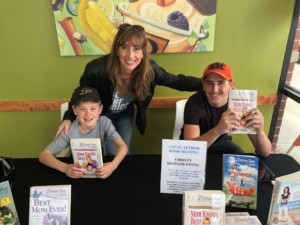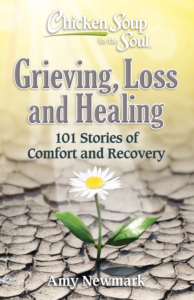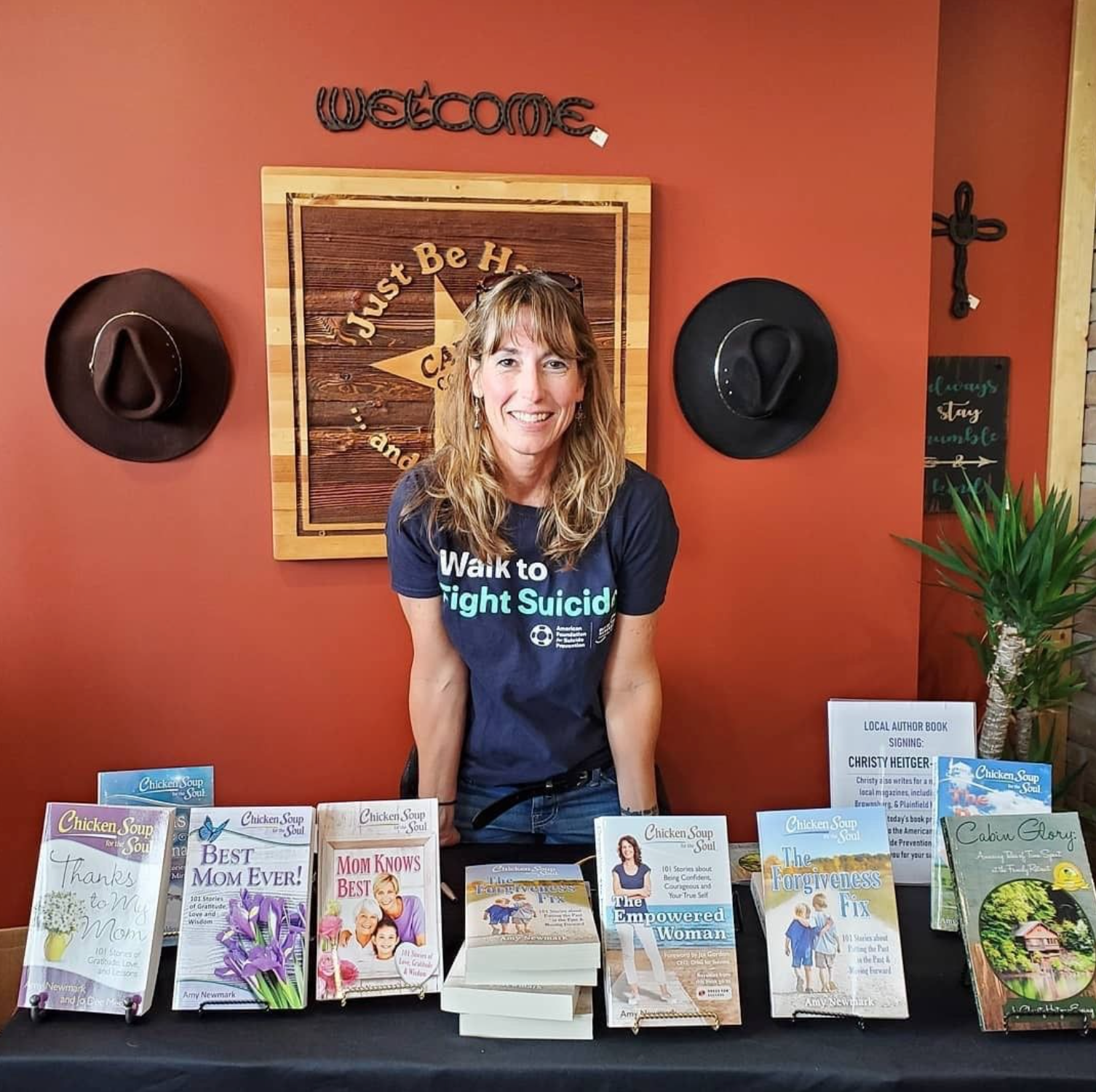Freelancer Writes About Grief, Healing and Moving On
Writer / Jamie Hergott
Photography Provided
As a full-time freelance writer, Christy Heitger-Ewing is no stranger to sharing her true and authentic self with the world. Ever since she was a child, she’s grown from writing short stories and comics to being published in more than 60 magazines and writing more than 2,500 magazine articles.
Heitger-Ewing, who regularly writes for Avon, Brownsburg, and Plainfield Magazines, recently published her 14th story for the “Chicken Soup for the Soul” collection, titled “Muted Joy.” It’s about one of life’s greatest pains – losing her mother.
“I’ve always been super transparent in my writing,” she says. “This story shares how I walked that path and started breathing, living and laughing again.”
 When Heitger-Ewing first started freelance writing 18 years ago, she submitted article ideas to various magazines and anthologies, “Chicken Soup for the Soul” being one of them. She was drawn to these publications because they are a collection of poignant stories written from personal life experiences, and it gave her an opportunity to share her life with others.
When Heitger-Ewing first started freelance writing 18 years ago, she submitted article ideas to various magazines and anthologies, “Chicken Soup for the Soul” being one of them. She was drawn to these publications because they are a collection of poignant stories written from personal life experiences, and it gave her an opportunity to share her life with others.
Many of her “Chicken Soup” stories center around her mother, Rozella, who was Heitger-Ewing’s biggest supporter in life.
“She was kind, gentle, generous and had the hugest heart,” she says. “Unfortunately, she also wrestled with clinical depression. Sadly, she lost that fight in April 2013. That’s when my world fell apart.”
After losing her mother to suicide, Heitger-Ewing was plagued with agony, guilt, anger, sadness and confusion. The feelings were relentless, like the constant push and pull of ocean waves that cannot be contained. They were so overwhelming that she wasn’t sure she could bounce back from the pain.
Heitger-Ewing recognized that her mother’s generation did not speak of mental illness often. They especially did not share internal struggles with others. Her mother kept her pain to herself, and that is precisely why Heitger-Ewing has decided to write about anxiety and depression.
“It breaks my heart to think of her suffering in silence,” Heitger-Ewing says. “After she died, I became a huge mental health awareness advocate and began volunteering with the American Foundation for Suicide Prevention (AFSP). In the past nine years I’ve written a great deal about depression, anxiety and suicide because I want others to know they are not alone, that there is help available, and that people care.”
In “Muted Joy” she tells the story of how hopeless, helpless and lifeless she felt after her mother’s death. She shares the pain and path she walked, and she also shares the life-giving tools she used to heal from that pain. One of those tools was a support group at Hendricks Regional Health in Danville. She said the group was her lifeline through the first two years after her mother died.
“It was my safe place where I could go and be in the company of others who knew exactly how I was feeling without me having to explain it,” Heitger-Ewing says. “Again, it comes back to sharing honest, true, real feelings.”
Heitger-Ewing wants others to know they are not alone. She is passionate about sharing the hope she found in her path of grieving. She recognizes grief can be deep and gut-wrenching, the kind that physically hurts. She knows that pain well, but she wants to let those who are grieving know that the degree to which the pain incapacitates you will not last forever.
“When you are struggling to eat or sleep or think or function, it will not always be that way,” Heitger-Ewing says. “You can’t skip it, go around it or pretend like it’s not there, or you’ll prolong the pain. If, however, you let yourself feel your feelings, if you find proper support systems, if you utilize tools to help you process your grief, slowly that pain begins to subside.”
Besides her support group, Heitger-Ewing leans heavily on her other go-to tools, such as exercising, journaling and volunteering. These have all aided her in slow healing from her loss.
 She feels that her story is particularly poignant during this time in history because there has been a spike in anxiety and depression across all demographics since the beginning of the COVID-19 pandemic.
She feels that her story is particularly poignant during this time in history because there has been a spike in anxiety and depression across all demographics since the beginning of the COVID-19 pandemic.
“Enduring a sustained trauma is so hard on us psychologically,” she says. “I want people to recognize that it’s understandable if they are struggling. I want them to not be afraid to seek help from a mental-health professional.”
Heitger-Ewing also has much to live for and knows that life goes on after loss. She and her husband Eric have two sons and four rescue cats. Her passion for running and writing, both of which she does daily, are activities that feed her soul. At the height of her heartache, running helped her tap into her emotions while also giving her a break from the daily grind of grief.
“Being out in nature and putting in some quiet miles as tears streamed down my face was extremely cathartic,” she says.
Her love for human-interest stories has led her to contribute to a number of local and national publications, always wanting her writing to “inspire hope and uplift weary souls,” she says. “I share the good, the bad, the ugly, but also the beautiful. I don’t like fake. What’s the point in that? When we share our authentic feelings, that’s how healing happens.”
Visit her author website at christyheitger-ewing.com.
Hendricks Regional Health’s support group for survivors of suicide loss meets on the first and third Tuesday of every month from 6 p.m. to 7:30 p.m. For more information, contact Sharon Samsell, bereavement and community support group coordinator, at 317-718-4360.






Comments 1
Thank you for using your pain to help others. I personally know Deb Rose (for many years) and we sadly reconnected after I lost my son to Soldier PTSD Suicide in 2015. I look forward to getting your book!